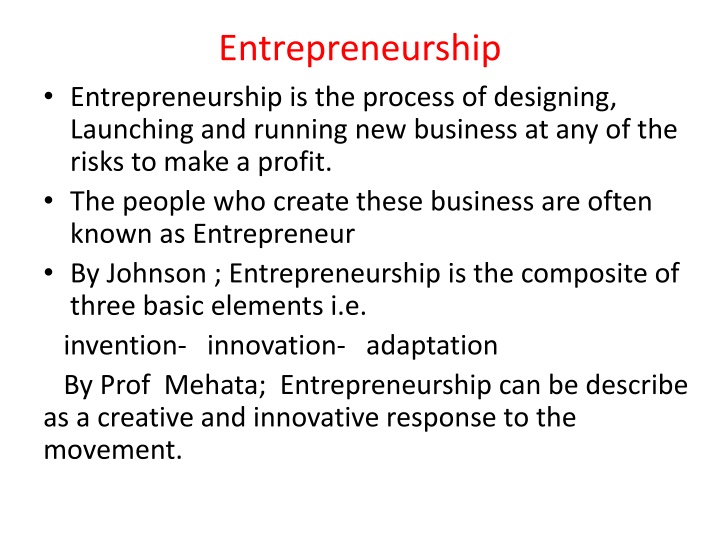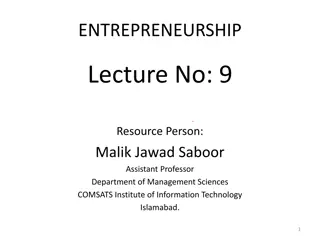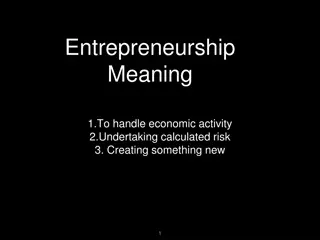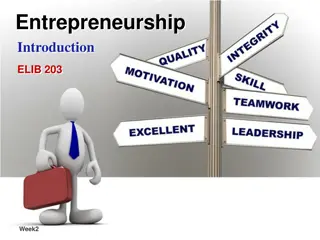Entrepreneurship: Process, Characteristics, and Nature
Entrepreneurship is defined as the process of designing, launching, and running a new business to make a profit, involving elements such as invention, innovation, and adaptation. This creative and innovative response to market movements requires individuals with intellectual capabilities like creativity and imagination, future vision, hard work, technical knowledge, communication skills, optimism, risk-bearing capacity, and self-confidence. The nature of entrepreneurship emphasizes the ability to innovate, economic activity, risk-taking, opportunity-seeking, organization creation, achievement-oriented, principles-based, and professional activity in the 21st century. The concept is not just a personality trait but a behavior essential in all types of businesses and activities, reflecting global phenomena and enabling an independent lifestyle.
Download Presentation

Please find below an Image/Link to download the presentation.
The content on the website is provided AS IS for your information and personal use only. It may not be sold, licensed, or shared on other websites without obtaining consent from the author.If you encounter any issues during the download, it is possible that the publisher has removed the file from their server.
You are allowed to download the files provided on this website for personal or commercial use, subject to the condition that they are used lawfully. All files are the property of their respective owners.
The content on the website is provided AS IS for your information and personal use only. It may not be sold, licensed, or shared on other websites without obtaining consent from the author.
E N D
Presentation Transcript
Entrepreneurship Entrepreneurship is the process of designing, Launching and running new business at any of the risks to make a profit. The people who create these business are often known as Entrepreneur By Johnson ; Entrepreneurship is the composite of three basic elements i.e. invention- innovation- adaptation By Prof Mehata; Entrepreneurship can be describe as a creative and innovative response to the movement.
Concept of Entrepreneurship Entrepreneur Entrepreneurship Enterprise r r Person process of action Outcome
Enterprise An Entrepreneur is a person who starts an Enterprise. The process of creation is called entrepreneurship. The entrepreneur is the actor and entrepreneurship is the act. The outcome of the actor and the act, is called the enterprise. An enterprise is the business organization that is formed and which provides goods and services, creates a jobs, contributes to national income, exports and contributes to the overall economic development.
Characteristics of entrepreneur 1) Intellectual capabilities: Intelligence-creative thinking-Imagination 2) Future Vision: Market situation- Business Environment 3) Hard work : dedication- efforts 4) Technical Knowledge : Latest technology 5) Communication skills : Express ideas-proper communication 6) Highly optimistic : Think positively- hopeful, confident 7) Risk bearing capacity : calculated risk-face challenges- seek opportunities 8) Self confidence : positive desires- self motivation
Characteristics and Nature of Entrepreneurship 1) Ability to Innovate / creation of enterprise 2) Economic activity 3) Risk bearing capacity 4) In search of opportunities 5) Organization creation 6) Result of high achievement/ambition 7) Based on principles not on intuition: soc, Psy 8) professional activity : 21st century
continue 9) Result of changes : change fashion, trend, need of customer 10) Entrepreneurship is behavior not a personality trait. 11)Essential in all types of business 12) Essential in all activities 13)Different types of entrepreneurship 14)It is global phenomena 15)Independent lifestyle
Importance of Entrepreneurship 1) Basis of economic development of Nation 2) Helps in establishing new enterprise 3) Contribution in development expansion of existing enterprises 4) Helps in developing new products & techniques 5) Opportunity to exploit full human potential 6) Creation of employment opportunities 7) promotes capital formation 8) Balanced economic development 9) Helps in execution of Govt. policies & plans 10) Helps in social change 11) Encourage research and investigation
Challenges, Issues and Barriers of Entrepreneurship 1) Personal barrier: Attitude, character, Lack of creativity & Innovations Lack of Motivation & Self confidence Lack of Patience , self motivated Or by others, speakers 2) Financial Barrier: 3) Environmental Barrier: Lack of Raw Material, Lack of Infrastructure, Lack of Human resources 4) Political barrier : Government/ Bureaucracy 5) Societal Barrier: Diversity, communal fear, conservative attitude, race, religious affiliation
continue 6) Fear of Success 7) Lack of planning 8) Legal problems 9) Few opportunities 10) Lack of Experience 11) Lack of practical knowledge
Entrepreneurial Process: Entrepreneurship is a process, a journey, not the destination; a means, not an end. All the successful entrepreneurs like Bill Gates (Microsoft), Warren Buffet (Hathaway), Gordon Moore (Intel) Steve Jobs (Apple Computers), Jack Welch (GE) GD Birla, Jamshedji Tata and others all went through this process. To establish and run an enterprise it is divided into three parts the entrepreneurial job, the promotion, and the operation. Entrepreneurial job is restricted to two steps, i.e., generation of an idea and preparation of feasibility report
Entrepreneurial Process: clip_image002
The Entrepreneurial Process Idea Generation: To generate an idea, the entrepreneurial process has to pass through three stages: a. Germination: This is like seeding process, not like planting seed. It is more like the natural seeding. Most creative ideas can be linked to an individual s interest or curiosity about a specific problem or area of study. b. Preparation: Once the seed of interest curiosity has taken the shape of a focused idea, creative people start a search for answers to the problems. Inventors will go on for setting up laboratories; designers will think of engineering new product ideas and marketers will study consumer buying habits.
c. Incubation: This is a stage where the entrepreneurial process enters the sub- conscious intellectualization. The sub-conscious mind joins the unrelated ideas so as to find a resolution. 2. Feasibility study: Feasibility study is done to see if the idea can be commercially viable. It passes through two steps: a. Illumination: After the generation of idea, this is the stage when the idea is thought of as a realistic creation. The stage of idea blossoming is critical because ideas by themselves have no meaning. b. Verification: This is the last thing to verify the idea as realistic and useful for application. Verification is concerned about practicality to implement an idea and explore its usefulness to the society and the entrepreneur.
Importance of Entrepreneurship: Entrepreneurship offers the following benefits: Benefits of Entrepreneurship to an Organisation: 1. Development of managerial capabilities: The biggest significance of entrepreneurship lies in the fact that it helps in identifying and developing managerial capabilities of entrepreneurs. An entrepreneur studies a problem, identifies its alternatives, compares the alternatives in terms of cost and benefits implications, and finally chooses the best alternative. This exercise helps in sharpening the decision making skills of an entrepreneur. Besides, these managerial capabilities are used by entrepreneurs in creating new technologies and products in place of older technologies and products resulting in higher performance.
2. Creation of organizations: Entrepreneurship results into creation of organizations when entrepreneurs assemble and coordinate physical, human and financial resources and direct them towards achievement of objectives through managerial skills. 3. Improving standards of living: By creating productive organizations, entrepreneurship helps in making a wide variety of goods and services available to the society which results into higher standards of living for the people. Possession of luxury cars, computers, mobile phones, rapid growth of shopping malls, etc. are pointers to the rising living standards of people, and all this is due to the efforts of entrepreneurs.
4. Means of economic development: Entrepreneurship involves creation and use of innovative ideas, maximisation of output from given resources, development of managerial skills, etc., and all these factors are so essential for the economic development of a country.
Factors affecting Entrepreneurship: Entrepreneurship is a complex phenomenon influenced by the interplay of a wide variety of factors. Some of the important factors are listed below: 1. Personality Factors: Personal factors, becoming core competencies of entrepreneurs, include: (a) Initiative (does things before being asked for) (b) Proactive (identification and utilisation of opportunities) (c) Perseverance (working against all odds to overcome obstacles and never complacent with success) (d) Problem-solver (conceives new ideas and achieves innovative solutions) (e) Persuasion (to customers and financiers for patronisation of his business and develops & maintains relationships) (f) Self-confidence (takes and sticks to his decisions) (g) Self-critical (learning from his mistakes and experiences of others) (h) A Planner (collects information, prepares a plan, and monitors performance) (i) Risk-taker (the basic quality).
2. Environmental factors: These factors relate to the conditions in which an entrepreneur has to work. Environmental factors such as political climate, legal system, economic and social conditions, market situations, etc. contribute significantly towards the growth of entrepreneurship. For example, political stability in a country is absolutely essential for smooth economic activity. Frequent political protests, bandhs, strikes, etc. hinder economic activity and entrepreneurship. Unfair trade practices, irrational monetary and fiscal policies, etc. are a roadblock to the growth of entrepreneurship. Higher income levels of people, desire for new products and sophisticated technology, need for faster means of transport and communication, etc. are the factors that stimulate entrepreneurship. Thus, it is a combination of both personal and environmental factors that influence entrepreneurship and brings in desired results for the individual, the organisation and the society.
Types of Entrepreneurs: Depending upon the level of willingness to create innovative ideas, there can be the following types of entrepreneurs: 1. Innovative entrepreneurs: These entrepreneurs have the ability to think newer, better and more economical ideas of business organisation and management. They are the business leaders and contributors to the economic development of a country. Inventions like the introduction of a small car Nano by Ratan Tata, organised retailing by Kishore Biyani, making mobile phones available to the common may by Anil Ambani are the works of innovative entrepreneurs.
2. Imitating entrepreneurs: These entrepreneurs are people who follow the path shown by innovative entrepreneurs. They imitate innovative entrepreneurs because the environment in which they operate is such that it does not permit them to have creative and innovative ideas on their own. Such entrepreneurs are found in countries and situations marked with weak industrial and institutional base which creates difficulties in initiating innovative ideas. In our country also, a large number of such entrepreneurs are found in every field of business activity and they fulfill their need for achievement by imitating the ideas introduced by innovative entrepreneurs. Development of small shopping complexes is the work of imitating entrepreneurs. All the small car manufacturers now are the imitating entrepreneurs.
3. Fabian entrepreneurs: The dictionary meaning of the term fabian is a person seeking victory by delay rather than by a decisive battle . Fabian entrepreneurs are those individuals who do not show initiative in visualising and implementing new ideas and innovations wait for some development which would motivate them to initiate unless there is an imminent threat to their very existence. 4. Drone entrepreneurs: The dictionary meaning of the term drone is a person who lives on the labor of others . Drone entrepreneurs are those individuals who are satisfied with the existing mode and speed of business activity and show no inclination in gaining market leadership. In other words, drone entrepreneurs are die-hard conservatives and even ready to suffer the loss of business.
5. Social Entrepreneur: Social entrepreneurs drive social innovation and transformation in various fields including education, health, human rights, workers rights, environment and enterprise development. They undertake poverty alleviation objectives with the zeal of an entrepreneur, business practices and dare to overcome traditional practices and to innovate. Dr Mohammed Yunus of Bangladesh who started Gramin Bank is a case of social entrepreneur.























